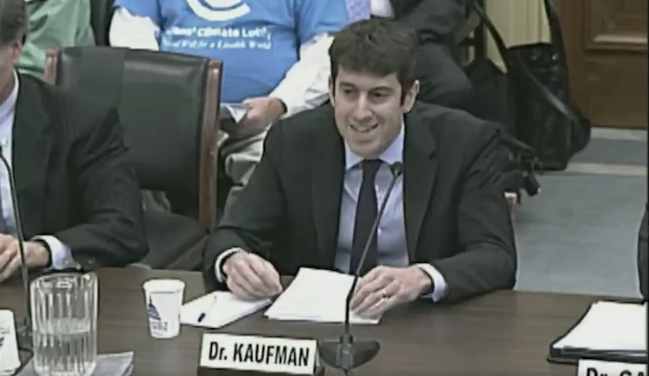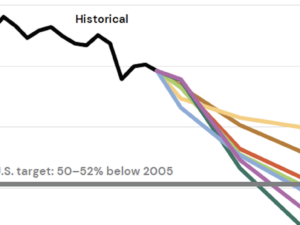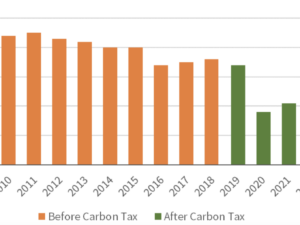By Jerry Hinkle, CCL Economics Policy Network
In part as a result of CCL’s efforts, Congress is now exploring climate policy design. They’re inviting expert witnesses to testify before key committees, educating Congress on these issues and helping them determine a path forward.

Dr. Noah Kaufman
On December 5, Dr. Noah Kaufman was one of those witnesses. Dr. Kaufman, a Research Scholar at Columbia’s Center for Global Energy Policy, testified before a subcommittee of the House Energy and Commerce Committee during a hearing called “Solutions for Economy-Wide Deep Decarbonization.”
His testimony reflected the independent views of one of the country’s leading experts on climate policy, and it supported CCL’s approach to climate policy. His remarks make it clear that the Energy Innovation Act is well-designed policy that is good for the economy and society. Several members of the Energy and Commerce committee are well aware of the bill’s benefits: Rep. Anna Eshoo, Rep. Scott Peters, Rep. Yvette Clarke, Rep. Jan Schakowsky, and Rep. Robin Kelly are all committee members who cosponsor the bill.
This post summarizes key points from Dr. Kaufman’s testimony:
The need for U.S. climate legislation is urgent. Dr. Kaufman began by saying, “No other country, particularly in the developing world, will adopt strategies consistent with net zero emissions targets unless the United States commits to its own comprehensive climate strategy.” U.S. action is essential for the necessary strong global efforts: our mission is critical.
Innovation alone will not work. He stated, “Focusing on technological progress alone [i.e., innovation] will not work.” In one best-case scenario, reductions through innovation alone would decline by less than one-third over the next few decades.
Carbon pricing is crucial. Dr. Kaufman stated, “A carbon price should be part of a comprehensive climate policy” because it “would achieve large emissions reductions at a small cost.” As a result, “studies suggest roughly zero impacts on the overall growth of the U.S. economy.” Plus, these studies “ignore the economic benefits of avoided regulations and the innovation stimulated by the carbon price,” as well as the climate and health benefits from the policy. So, not only are there essentially no negative impacts, but there are lots of positives to be gained with this type of policy. Dr. Kaufman made it clear that policies that dictate how emissions are to be reduced, such as most regulations, will achieve reductions at much greater costs, and this may detract from their popularity and sustainability. In sum, he states “For any policymaker with the goals of deep decarbonization and a strong economy, putting a price on carbon dioxide emissions is a no brainer.”
Watch here:
"Putting a #PriceOnCarbon should be a no brainer."
That's what economist @noahqk from @ColumbiaUEnergy told the House @EnergyCommerce Committee at a recent hearing.
Watch his remarks here: pic.twitter.com/5Ez8WOyBOV
— Citizens' Climate Lobby (@citizensclimate) January 15, 2020
Good policy protects the poor. We should be cognizant that many cannot afford the energy cost increase that results from carbon pricing. He states, “The most straightforward way to protect those who cannot afford price increases is to use the revenue to provide compensation for the increase in expenditures caused by the carbon price: such payments are often called ‘carbon dividends.’” He notes that H.R. 763 is a “highly progressive policy” that will benefit the poor financially.
With a strong price, some regulations may not be necessary. Dr. Kaufman explained that cost savings may be attained by curtailing or eliminating policies made redundant by a carbon price. Specifically, regulations that cover the same emissions and “subsidies for the deployment for relatively mature and widely used technologies” may be reduced to achieve additional regulatory benefits from the policy.
Dr. Kaufman made other important points regarding climate policy design. He states that a border carbon adjustment, or a viable alternative, should be included to protect the competitiveness of American industry. Coal is the only U.S. industry that will see significant harm, so in his estimation, “a small fraction of the revenue” from the carbon price should be used to expand economic opportunities for affected communities.
And finally, Dr. Kaufman says, other policies should be enacted to complement the carbon price, such as research and development funding for low-carbon technologies, and energy efficiency standards, as these would “enable even faster and cheaper emissions reductions.”
In summary, he stated, “By implementing a comprehensive suite of climate policies, including carbon prices that are designed for consistency with emissions targets, the United States can put itself on a pathway to deep decarbonization while meeting the growing demands on its energy system and lands and maintaining a thriving economy.”
A policy that puts a price on carbon pollution is a clear win for the economy and society as well as for the environment and our future. CCL, you’re doing the right work, and Dr. Kaufman just confirmed that to the House of Representatives’ Energy and Commerce Committee.
Jerry Hinkle is an economist who holds master’s degrees in Economics and Climate Policy.
The Economics Policy Network is a team of CCL leaders and supporters with a diverse background in the field of economics. These network contributors write regular guest posts, offering thorough insight into topics that fall within their expertise. Their resources are available in the form of white papers on CCL Community.






